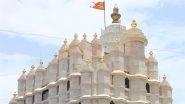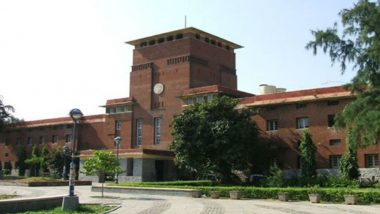New Delhi, May 14: The Delhi University will hold examinations for its final year post graduate and under graduate students from July 1 and in case the situation arising out of the COVID-19 outbreak does not normalise, it will adopt 'Open Book' mode to conduct the test, the varsity said on Thursday.
Under the 'Open-Book' mode of examination, the student will be able to refer books, notes and other study materials to answer the questions. Students will sit in their homes and will download question papers for their respective course from the portal. They will upload the answers in a span of two hours. Entrance Exams Including JNU, UGC NET, PhD, NEET, TTE Postponed Amid Coronavirus Lockdown.
In a notification, the varsity said examinations for final year postgraduate and undergraduate students, including exams for students registered with School of Open Learning (SOL) and Non Collegiate Women Education Board (NCWEB) will begin from July 1.
"All these examinations shall be conducted in three sessions in a day including Sundays with a duration of two hours. A detailed date sheet is likely to be notified by the end of this month. "In case the situation does not appear to be normal in view of COVID-19 and to maintain social distancing, safety and health of the students, the university will adopt alternative mode of examinations i.e. Open Book Examinations (OBE) for final semester/term/year UG and PG students of all programmes and streams along with arrears (ER) of previous semesters/term/year," the notification said.
Students will be allowed to attempt their examinations as per the date sheet and courses as filled in examination form from seating at home or any place as per instructions issued in this regard, the varsity said.
The varsity said separate guidelines for examinations of the students of first and second year in case of undergraduate programmes and first year in case of postgraduate programmes, shall be issued. PTI SLB TDS TDS 05141736 NNNN statement says "Australian athletes should prepare for a Tokyo Olympic Games in the northern summer of 2021."
The four-week waiting period will sort out the details for a decision that's likely already been reached — at least by several large national Olympic committees. Now the IOC needs time to negotiate with broadcasters and sponsors, and also convince Japan to come along.
As of Tuesday, Japan had 1,128 confirmed cases of the 42 deaths attributed to the coronavirus. The situation in Japan seems almost normal with ordinary daily activity continuing, a stark contrast to Europe and the United States.
The IOC had income of $5.7 billion in the last four-year Olympic cycle (2013-2016), and 73% was from selling broadcast rights. About half of that comes from U.S. network NBC. The IOC also has reserve funds of about $2 billion and insurance to cover loses.
Japan is footing most of the bills for hosting the games, and is likely to pay most of the added costs. Details of the agreement signed in 2013 between the IOC and Japan is available in the 81-page Host City Contract.
Japanese organizers say officially they are spending $12.6 billion to organize the Olympics, but a national audit says it's at least twice that much. The expenditures are all public money except $5.6 billion in a privately funded organizing committee operating budget.
Bent Flyvbjerg, an author of "The Oxford Olympics Study 2016: Cost and Cost Overrun at the Games," described the IOC as a "monopoly" in an email to the Associated Press and said it needs to be regulated and share more of the costs.
He said the IOC needs to "pick up a larger part of the bill for the games, which the IOC profits from. It is an economically unhealthy arrangement, which generates all sorts of inefficiencies and waste."
He added: "Tokyo and Japan will pick up the added cost, unless the IOC makes an exception and expands the reserve fund, which is what the IOC should do from an ethics point of view."
Flyvbjerg's study has found the Olympics have the "highest average cost overrun of any type of mega-project." In the study, Flyvbjerg wrote: "For a city and nation to decide to stage the Olympic Games is to decide to take on one of the most costly and financially most risky type of mega-project that exists, something that many cities and nations have learned to their peril."
(The above story is verified and authored by Press Trust of India (PTI) staff. PTI, India’s premier news agency, employs more than 400 journalists and 500 stringers to cover almost every district and small town in India.. The views appearing in the above post do not reflect the opinions of LatestLY)













 Quickly
Quickly


